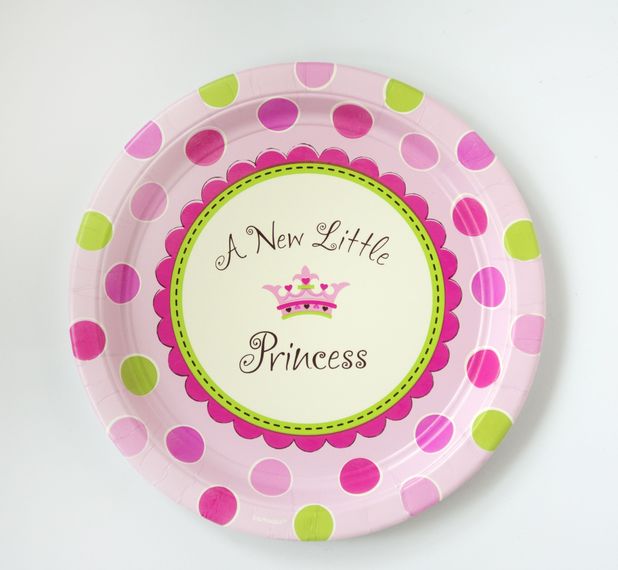
It appears the arrival of their first grandchild has been seen by Kate Middleton’s parents as a marvellous business opportunity.
They are promoting a range of baby goods on the Party Pieces website – with paper plates decorated with a blue or pink crown and the words “A New Little Prince” and “A New Little Princess”.
The Middletons are self-made New Money, and that is something to be admired. The skilful promotion of Party Pieces, which Carole Middleton founded 25 years ago, making up children’s party bags on her kitchen table, has catapulted them from humble beginnings in a modest semi-detached house, and from their meager salaried existence – she as a British Airways hostess, he as a BA dispatcher – to multi-millionaire dom.
When their eldest daughter began going out with Prince William, the Middletons had to brave social wisecracks about their former jobs. Yet they have nothing to be ashamed of: they represent the sort of aspirational and hard-working enterprise that Britain desperately needs more of.
But the marriage of their daughter into the Royal Family – and her future as the Queen consort of Britain, a delicately sensitive constitutional role – calls for discretion and careful judgment on their part.
Exploiting the impending birth of Kate Middleton’s baby, who will one day occupy the throne, in order to sell paper plates at £1.69 ($2.6) for a packet of eight, is not showing discretion or good judgment.
Miniature castles, “Prince” and “Princess” banners are among the other royal baby-themed products. A message on the firm’s website proclaims: “It’s a great occasion to celebrate before the new arrival, inviting family and friends along.” Such a celebration allows “other mothers to share their wisdom and own knowledge of becoming a mother”.
It’s hard to believe it did not occur to the Middletons that this would be seen as a cynical attempt to cash in on their daughter’s pregnancy.
It is not as if they need the money. Conservative estimates by City analysts put the value of Party Pieces at £40 million ($60 million). They own a £4.7 million ($7.2 million) seven-bedroom Georgian house in Berkshire, set in 18 acres of landscaped grounds, and a £1.6 million ($2.5 million) Chelsea flat.

Since Kate Middleton’s elevation to the ranks of royalty, the sales of products marketed by their company have escalated hugely. A lucrative licensing deal with the multi-millionaire teen idol Justin Bieber to sell a range of merchandise opened the door to vast worldwide income.
And the party plates are not the first instance of the Middletons facing accusations of cashing in on their royal connections.
Before the wedding of Prince William and Kate Middleton, courtiers became uneasy when Party Pieces launched a “Britannia” range, including royal trivia scratch cards.
The Queen’s Diamond Jubilee offered further possibilities. The company marketed Jubilee plates, bunting and balloons.
One set of plates bore a silver unicorn, like that on the royal coat of arms, and the date, 1952, the year of the Queen’s accession.
Other plates featured a Queen-style figure wearing a crown and the words: “Hope and Glory Tea and Scones”. Among other items were state carriage-shaped cardboard teapot vases, cups with coats of arms and the words “Long Live G&T” and canapé flags featuring crown-wearing corgies.
Concern was also generated by the business activities of Kate Middleton’s 25-year-old brother, Edinburgh University drop-out James Middleton, whose company specializes in selling adult-themed cakes with personalized bawdy messages that are unlikely to find their way on to the tea table at Buckingham Palace.
These have included “Boob-licious jiggly jugs” and “A willy that wriggles and gives me the giggles”. A Sexy Hubby cake displays a cartoon man with an arrow pointing to his private parts and the caption: “Weapon of mass seduction.”
Eyebrows rose still further when James Middleton was photographed baring his buttocks, and cross-dressing in the outfit of a French maid, one of the tackier items on the Party Pieces website, available in their Adult Occasions section at £14.99 ($23).
The company is even marketing, at £27.99 ($43), an inflatable sumo outfit, the same one that Kate’s sister, Pippa Middleton, recently revealed their father Michael once wore to enliven the family’s Christmas festivities in Berkshire.
The thrusting business enterprise of the Middletons has several times landed them in trouble. Last year they were obliged to amend their website over Games-themed goods after falling foul of strict advertising laws covering the London Olympics.
They were also accused by Britain’s Got Talent of illegally using its logo, and two months ago were forced by the Broccoli family to remove from their website the James Bond Skyfall logo, which they were using without permission to advertise 007-themed goods under the heading “James Bond Secret Agent Party”.
But for many, it will be their apparent attempt to exploit their daughter’s pregnancy that will seem a step beyond the bounds of acceptable behavior. Turning the birth of their first royal grandchild into a part of their business empire is the sort of mercenary and undignified behavior they should have scrupulously avoided. It exposes them to criticism and, by extension, reflects badly on Kate Middleton.
Have they not learned from the spectacle of the Duchess of York trying to earn money in order to stay out of debt and involving herself in projects that were often tasteless?
The question is whether the Middletons, who have dined privately with the Queen at Windsor and accompanied her to Royal Ascot, can continue to walk the tightrope of combining a quasi-royal status with their booming empire or are destined to become a liability and embarrassment to their daughter and son-in-law.
Dismissing criticism of their activities in the past, Carole Middleton said: “At the end of the day we are running a business, not a charity. We don’t want to do anything that will embarrass Catherine but I feel as if we are caught between a rock and a hard place.”